5 Best TWILIGHT ZONE Episodes for the Holidays

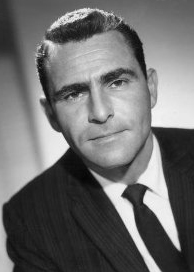
“I was a Christmas present that was delivered unwrapped,” once joked Rod Serling, the American screenwriter, novelist and television producer who is probably best known as the creator of The Twilight Zone, one of the most popular science fiction anthology TV series ever made.
Born on December 25, 1924, Christmas Day, Serling began his writing career after returning from military service in WWII. In the 1950s, with television in its infancy, Serling gained praise from critics for the realistic psychological dramas he created for CBS and NBC.
While his career flourished and he enjoyed considerable professional and personal success, his growing dissatisfaction with script interference by the conservative corporate censors of the 1950s led to a desire for less compromise and more control, and Serling decided that self-producing his own show was the solution.
With The Twilight Zone (1959-1964), Serling craftily blended morality fable and science fiction fantasy in order to circumvent his censors, and could more openly address the controversial moral, social and political issues of the day. A prolific writer, Serling penned almost two-thirds of the original series’ 156 scripts himself, while also hiring many of the leading science fiction and fantasy authors of the time to produce stories, including Ray Bradbury, Richard Matheson and Charles Beaumont.
Although dozens of The Twilight Zone’s original episodes are considered timeless classics today, only two, “Night of the Meek” starring Art Carney and “Changing of the Guard” with Donald Pleasence, were specifically crafted with Christmas themes. To round out my list of five offerings, I selected an additional three favorite episodes that I believe fit in nicely at this time of the year. All of my five choices were written by Serling himself.
So, after you’ve hung the tinsel and spiked the eggnog, I suggest that you turn off all of the lights and unwrap these very special holiday gifts courtesy of Mr. Serling and that wondrous land of imagination known as … The Twilight Zone.
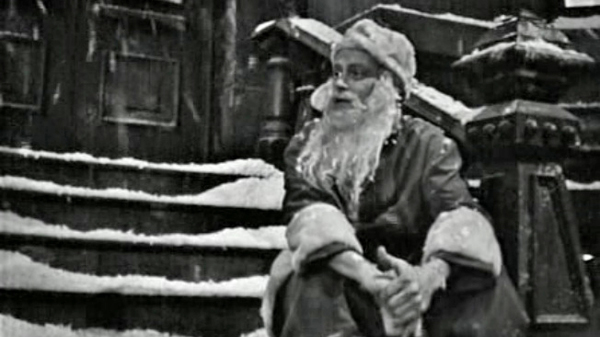
The Night of the Meek (first aired: December 23, 1960)
When down-on-his-luck department store Santa Claus Henry Corwin (Art Carney) arrives an hour late and drunk for his shift on Christmas Eve, his angry boss berates him as “a wino who’d be more at home playing Rudolf the Red-Nosed Reindeer!”
After collapsing in front of the parents and kiddies he was hired to greet, Henry is fired, but laments before departing, “Christmas is more than barging up and down department store aisles and pushing people out of the way. Christmas is finer than that, it should come with patience and love, charity and compassion.”
He adds that he drinks heavily because he lives in “a dirty rooming house on a street filled with hungry kids and shabby people, where the only thing to come down the chimney on Christmas Eve is more poverty.” His fervent wish is that for just one Christmas he could see some of the hopeless and the dreamless people he knows be happy.
When Henry later stumbles across a mysterious trash bag in a back alley whose tin can innards inexplicably transform themselves into shiny presents, he sets out to fulfill his Christmas wish by delivering to the less fortunate of the neighborhood their heart’s desire.
As the bag gives out its last gift at midnight, the ersatz Santa realizes that it was he who had truly been given the very best gift it contained, and the joy he feels leads to heartwarming and magical consequences.
Serling’s tight script and comedy legend Art Carney’s bravura performance as the dilapidated Santa redeemed by his own unselfish dreams are what raise this episode out of the purely sentimental and into the “not-to-be-missed holiday classic” category.
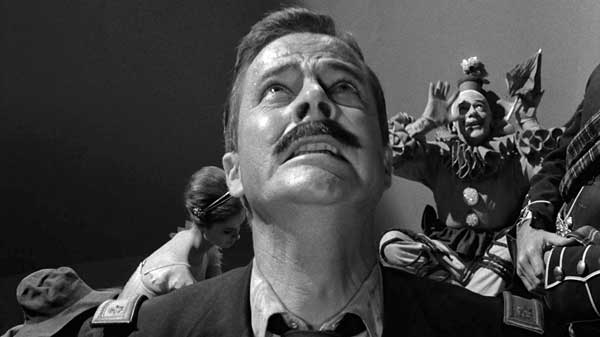
Five Characters in Search of an Exit (first aired: December 22, 1961)
An odd group of characters, including a bagpipe player, a ballet dancer, a clown, a hobo and an Army major, wake to find themselves at the bottom of a high-walled and ceiling-less room, but have no recollection of who they are or what they are doing there.
The Army major (William Windom) decides to find a way out of their prison but has no success. The others seem resigned to the situation, and after admitting that they feel neither hunger and thirst nor fatigue, they spend time speculating on where or what they might actually be. Every now and then a loud clanging sound breaks the quiet and makes the walls shake.
Eventually the major convinces the group to make a human ladder to the top of the featureless wall, and after the first failed attempt he succeeds in discovering the answer to the mystery.
The twist ending is what decidedly positions this on my holiday list, plus the characters’ introspection about their existence is never a bad thing to ponder at the end of another year.
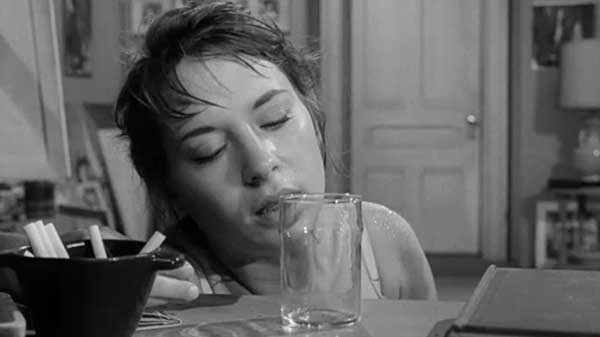
The Midnight Sun (first aired: November 17th, 1961)
The Earth has somehow slipped out of its elliptical orbit and begun an unstoppable journey towards the Sun, generating sweltering temperatures across the planet and eventually dooming mankind. Millions of people have fled to northern climes in an effort to temporarily prolong their existence, while those few who remain behind suffer the interruptions to power, lack of fresh water and dwindling resources as best they can.
In one abandoned city, a young painter named Norma (Lois Nettleton) and her despairing next-door neighbor Mrs. Bronson find themselves the last remaining residents of their apartment building. Their supply of water grows short, and the infrequent radio broadcasts predict steadily worsening conditions.
As temperatures continue to skyrocket, the electricity finally fails. Their fear of looters or worse causes the women to cower in terror when an angry stranger breaks into Norma’s apartment. But after gulping down the last of their water, the intruder sheepishly apologizes to the women and leaves, and they realize he was just another desperate person driven mad by the heat.
Soon afterward Mrs. Bronson collapses and presumably dies, and following the hallucinatory experience of watching her treasured oil paintings literally melt before her eyes, Norma too slips into unconsciousness.
The twist ending reveals why I consider this The Twilight Zone episode eminently suitable for holiday viewing. It’s also intriguing to learn that this episode was shot during the summer on a set without air-conditioning, and that the director actually turned up the heat on key scenes to add extra realism for the actors. You can almost smell the sweat!
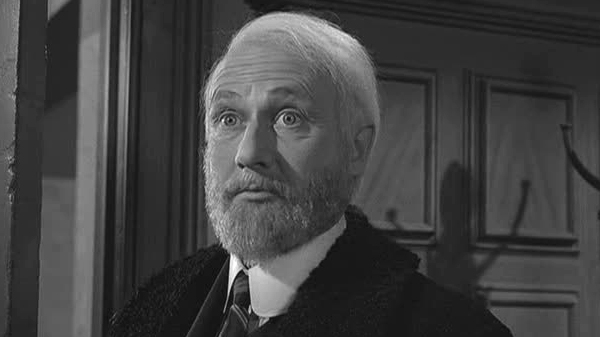
The Changing of the Guard (first aired: June 1, 1962)
On Christmas Eve, elderly Professor Ellis Fowler (Donald Pleasence) is heartbroken to learn of his school’s plans to replace him with a younger teacher. Unable to come to grips with this forced retirement, he becomes convinced that his life’s work has had no meaning, and contemplates killing himself.
In the depths of his despondency, Fowler is confronted by the spirits of his former students, who help him to see that the lessons they learned from him added much more to their lives than he ever realized, and that he inspired them all to become better people. Deeply moved by this experience, Fowler is finally able to accept that his life was indeed worthwhile. The heartfelt message here is that we should never underestimate the impact we might have on somebody else’s life.
This was the first American TV acting role for the British-born Pleasence, who later went on to shine in such iconic roles as Bond arch-villain Ernst Stavro Blofeld in You Only Live Twice (1967), SEN 5241 in George Lucas’ feature directorial debut THX 1138 (1971) and psychiatrist Sam Loomis in the Halloween series.
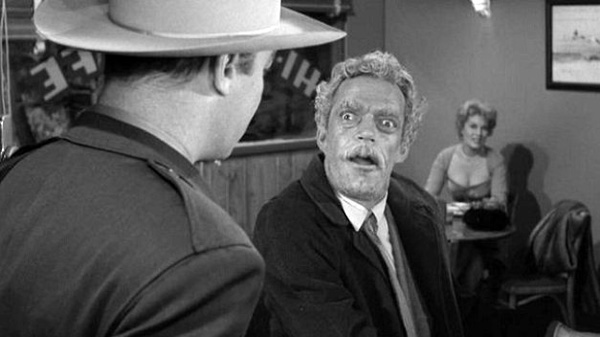
Will the Real Martian Please Stand Up (first aired: May 26th, 1961)
During a heavy snowstorm, two state troopers investigate a reported crash and follow a single set of footprints from the crash site to a roadside diner. There they find a group of people from a bus to Boston stranded by the storm, who are waiting for word on a whether or not the bridge up ahead is safe to cross.
Although the patrons at the diner number eight, the driver swears that only six people and himself were on his bus. But the driver does not remember exactly who among the patrons originally boarded, and no one will admit to being the extra person. The suggestion that the crash might have been a flying saucer causes the patrons to start suspecting that one of them is an alien, but which one is it?
Everyone, including the diner’s cook, is unnerved when a series of weird events occurs, such as the jukebox playing by itself and the diner’s lights flickering off and on at random. Eventually a ringing phone delivers the news that the bridge ahead has been cleared for travel. Unable to arrest anyone “on the suspicion of being a monster,” the troopers decide to let everyone go. The passengers and bus driver re-board and continue on their way.
Later, a lone passenger returns to the diner and announces that the bridge in question was indeed unsafe. He tells the surprised cook that the state troopers’ car and the bus have plunged into the river, inexplicably killing everyone but himself. However, the cook has an even bigger surprise of his own to share.
The 1950s fake snow effects adds a nice wintry feeling to this amusing episode, and the totally unexpected ending (which scared the pants off of me as a kid!) is a marvelously ironic shocker.
>>>>

You can find these and 151 other amazing tales in “The Twilight Zone: The Complete Definitive Collection” 24-DVD set, which includes audio commentaries by many Twilight Zone actors including Martin Landau, Don Rickles, Cliff Robertson, Jonathan Winters, Bill Mumy, Leonard Nimoy, Mickey Rooney, and Mariette Hartley, as well as video interviews with Twilight Zone writers Richard Matheson, George Clayton Johnson, and Earl Hamner, Jr. — plus LOTS of other special features!
![]()


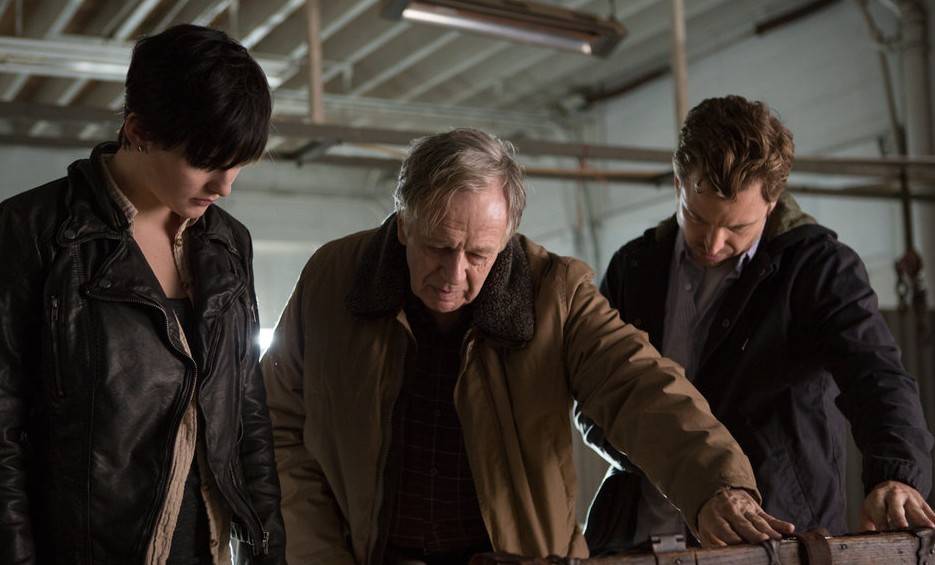
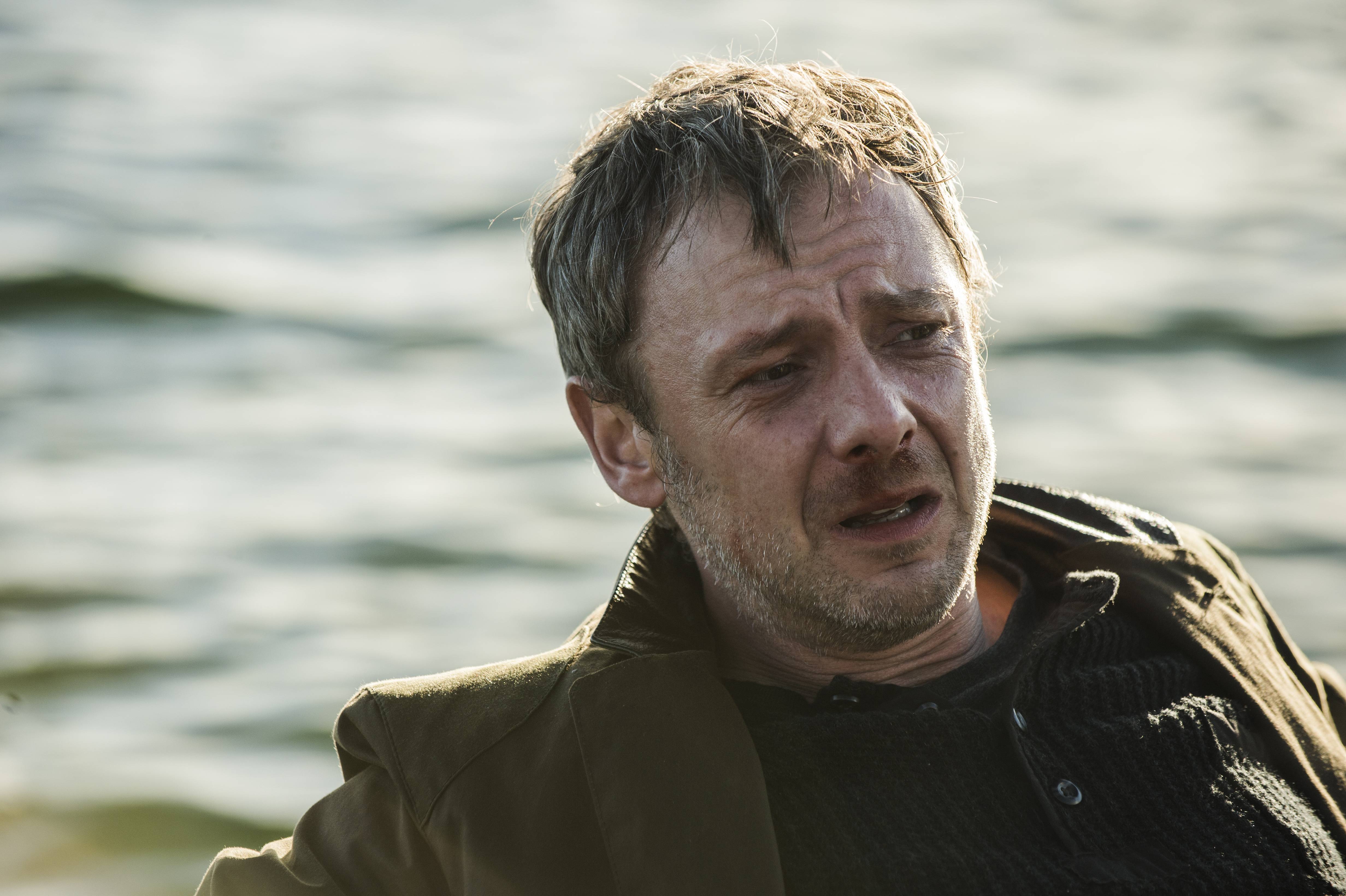
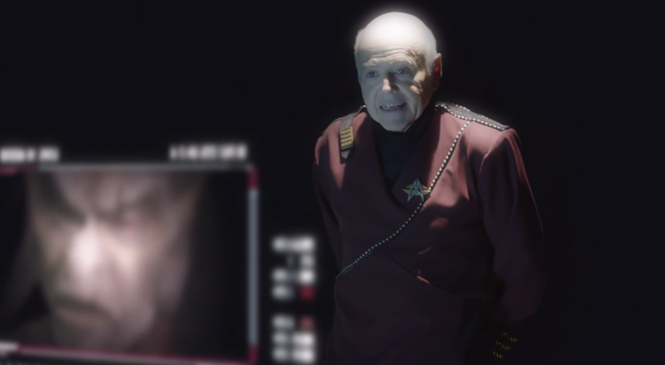
“Will the Real Martian…” is one of my very favorites. Jack Elam steals the show!
Changing of the guard is THE best